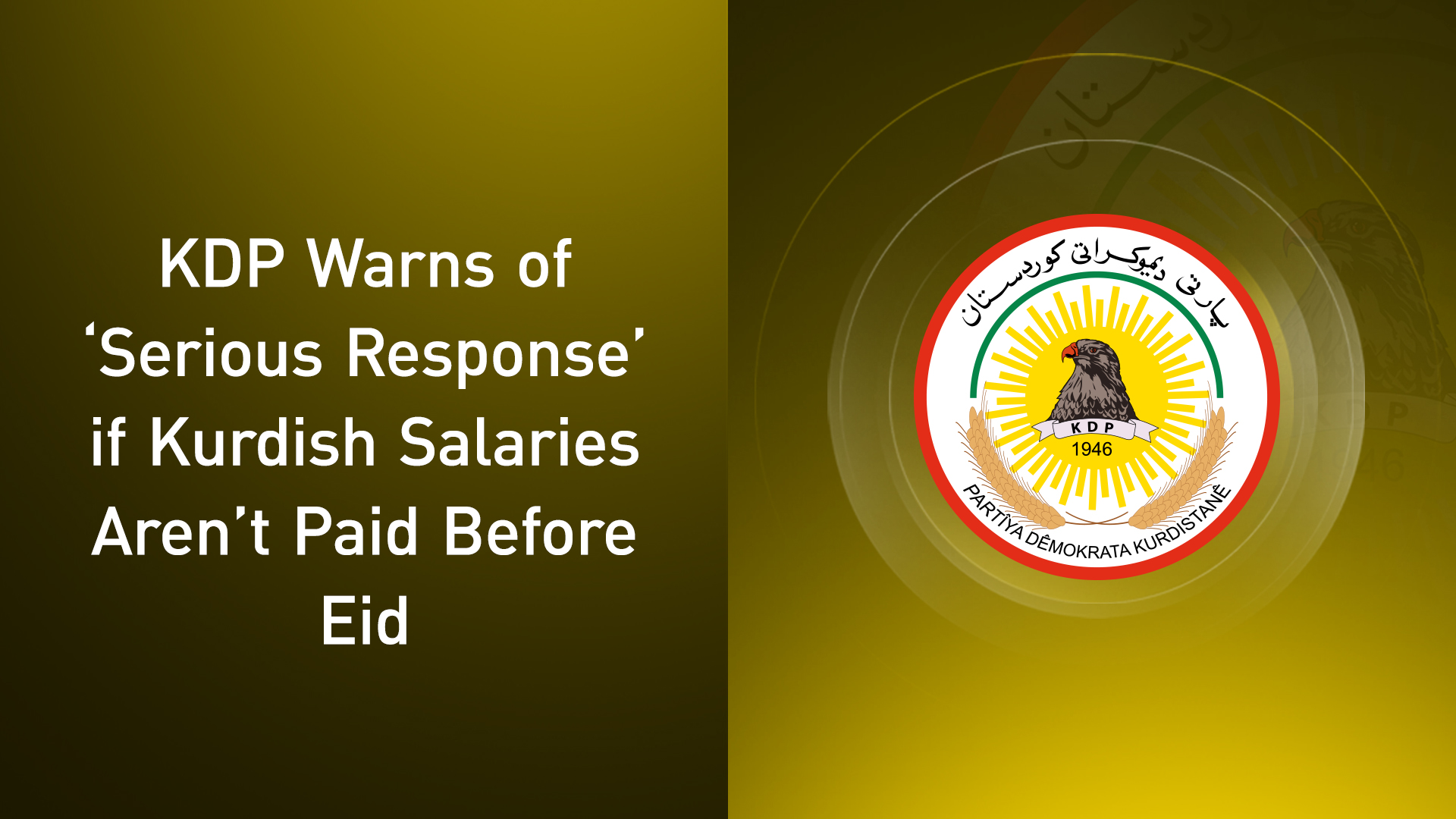KDP Warns of ‘Serious Response’ if Kurdish Salaries Aren’t Paid Before Eid
The KDP confirmed that the matter will be addressed during its Central Committee’s upcoming meeting scheduled for the upcoming Monday, stating: “If the Kurdistan Region’s financial entitlements are not transferred before Eid al-Adha, we will adopt a serious position and announce it publicly.”

ERBIL (Kurdistan24) — The Kurdistan Democratic Party (KDP) has issued a stern warning to the Iraqi federal government, declaring that it will adopt a "serious stance" if salaries owed to the Kurdistan Region are not disbursed before the upcoming Eid al-Adha holiday.
The statement, released by the KDP’s Politburo on Thursday, came in response to a letter issued the previous day by the Iraqi Federal Ministry of Finance, which formally announced its decision to withhold the monthly salaries of public employees in the Kurdistan Region.
“We are notifying the people of Iraq and the Kurdistan Region that the federal government continues to violate the constitutional rights of the Kurdistan Region,” the KDP's statement said. “The ministry’s recent letter is politically motivated and contradicts the foundations of Iraq’s constitutional framework and government formation agreements, placing economic pressure on the Kurdish population.”
The KDP confirmed that the matter will be addressed during its Central Committee’s upcoming meeting scheduled for Monday, stating: “If the Kurdistan Region’s financial entitlements are not transferred before Eid al-Adha, we will adopt a serious position and announce it publicly.”
Parliamentary Response
Also on Thursday, Vian Sabri, head of the KDP parliamentary bloc in the Iraqi Parliament, told reporters that Kurdish factions are preparing a formal letter of protest against Iraqi Finance Minister Taif Sami’s decision to withhold funds. The letter will be submitted to the Iraqi Prime Minister, Mohammed Shia al-Sudani.
Dr. Sabri noted that the Finance Committee in Parliament has repeatedly requested the federal government to provide accurate monthly expenditure data, particularly regarding actual spending. “So far, only January’s expenditures have been disclosed,” she stated. “How can the federal government claim that the Kurdistan Regional Government (KRG) has exceeded its budget allocation if they haven’t even provided the necessary data?”
She firmly rejected the Finance Ministry’s claims, emphasizing that the federal budget law was amended specifically to facilitate oil revenue transfers and ensure financial transparency. However, the federal government has yet to adhere to the amendments and resume oil transfers from the Kurdistan Region.
Systematic Financial Marginalization by Baghdad
For over a decade, the Iraqi federal government has consistently weaponized public finances to punish and pressure the Kurdistan Region, using budget allocations as a political tool rather than honoring constitutional obligations. Despite the Kurdistan Region’s full cooperation in budget negotiations and its continuous readiness to resolve outstanding issues through dialogue, Baghdad has repeatedly breached agreements—most notably those related to the Region’s share of the federal budget and oil revenues.
The 2023 federal budget, supposedly designed to normalize fiscal relations, was passed after intense negotiations and promises of stable monthly transfers to the KRG. However, true to form, the federal government failed to implement the law fairly or transparently. Baghdad's Finance Ministry has now attempted to justify its latest salary freeze by accusing the Kurdistan Region of not transferring an alleged 19.2 trillion dinars in oil and non-oil revenues—claims that lack transparency, factual grounding, or independent verification.
This politically motivated financial blockade has deepened hardship for civil servants in the Kurdistan Region and exposed the federal government’s intent to erode the Region’s autonomy by starving it of its rightful resources. Kurdish lawmakers have repeatedly demanded access to federal expenditure data and full transparency from Baghdad, only to be ignored or stonewalled.
With Eid al-Adha approaching, the federal government's punitive and unconstitutional actions not only threaten the livelihoods of Kurdish citizens but also risk inflaming tensions and destabilizing the already fragile political climate in Iraq. The Kurdistan Region, despite its constitutional rights, continues to be treated as a subordinate entity rather than a legitimate federal partner.